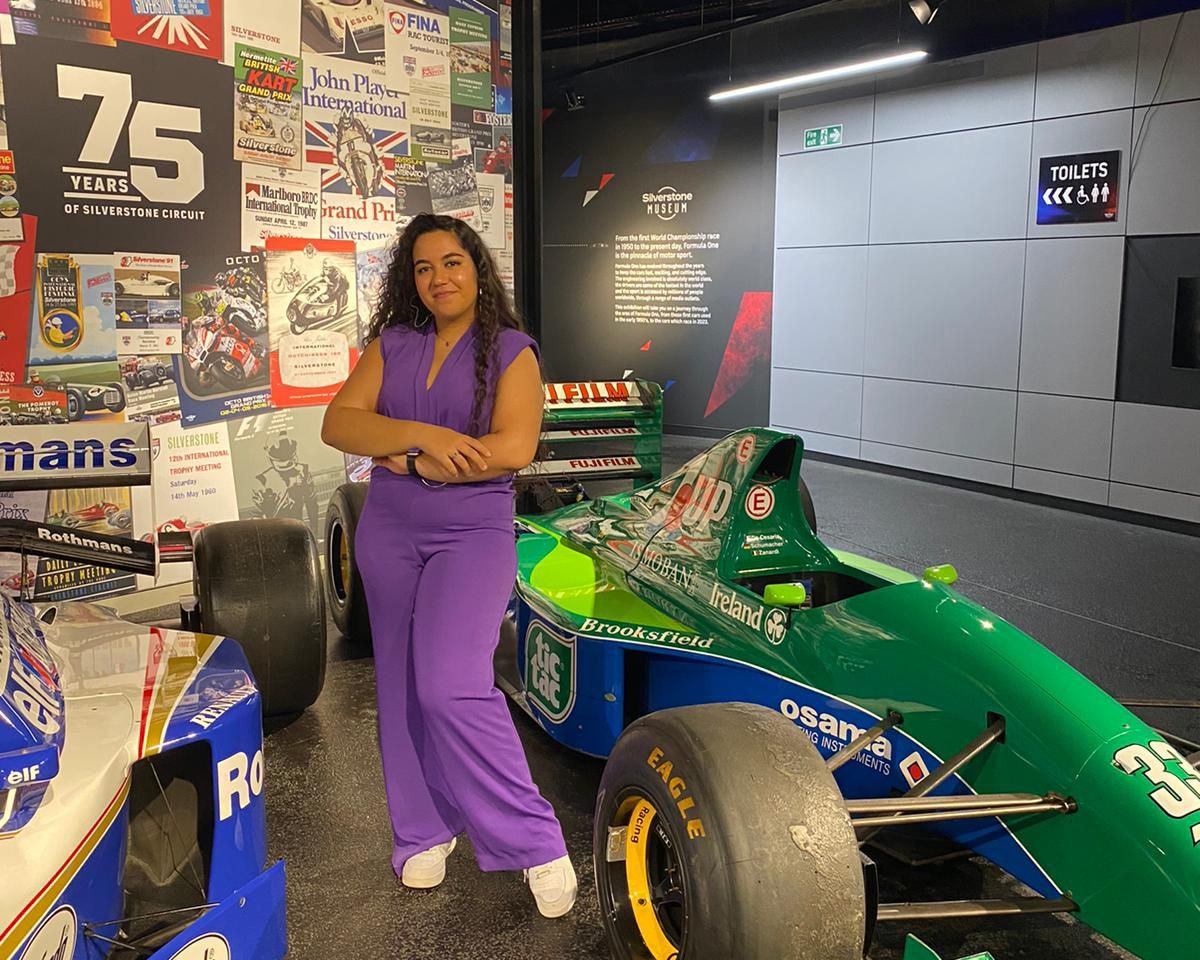Spotlight: How Girls on Track, Mission 44, and Racing Pride are helping all women find space in motorsport
Motorsport was once known as a wealthy white man’s sport. Female presence in the paddock too often used to limit women, for the most part, to being ‘grid girls’ or guests, rather than key personnel across the full spectrum of motorsport roles. In the last two decades, the industry has taken a clear shift. Shayni Solanki spoke to Mission 44 scholar Laila Fadli Dokkali and the Girls on Track UK Programme Manager Jenny Fletcher about the new spaces for women in motorsport. Laila, who is part of the LGBTQ+ community, spoke at the recent Accelerate Pride conference hosted by Racing Pride, illustrating through her story how progress needs to be intersectional to truly open up the sport for all women.
The sport needs to become inclusive of all genders and all protected characteristics. Individual experiences are cut across intersections of gender, sexuality, race, and ethnicity and interact with other cross-currents of neurodiversity and differences in physical ability. Inclusive spaces are open to all, to the benefit of all, and this is what motorsport needs to strive for.
Progress is being made, particularly about female participation across a range of roles. With more jobs becoming available in motorsport, more women than ever are joining the industry with hands-on jobs that have a direct impact on the development of motor racing vehicles. One of these women is Laila Fadli Dokkali.
“It’s important for kids to see people like them because you can’t aspire to be something you can’t see.”
Fadli Dokkali secured a fully-funded scholarship with Cranfield University to study engineering after applying through The Royal Academy of Engineering and Mission 44 partnership. Set to join the Mercedes AMG High-Performance Powertrains (HPP) team in September later this year through the Accelerating Women in Engineering Programme, she has fought tooth and nail for her place in the motorsport industry.
“I used to feel uncomfortable being the only black woman in a room, I experienced imposter syndrome and I undermined myself a lot,” Fadli Dokkali explained. “The first time I met the other Mission 44 scholars was great. It was amazing to finally have that safe place and group of people who shared the same passion as me and life experience.”
Mission 44 is a charitable foundation established by the Formula 1 icon Lewis Hamilton, to carve new spaces in motorsport and empower young people from underserved communities. Building on the findings of The Hamilton Commission, a research project to identify and improve the presence of black people in motorsport, Mission 44 set up scholarships and partnerships for young people aspiring to reach motorsport. Since its conception in 2021, the programme has launched a Diversity in Education Fund, Youth Advisory Board, and sent several aspiring engineers to further education pathways.
The Hamilton Commission, on the other hand, was set up in 2020 as a research project rather than a programme to understand why black people in the UK were less inclined to join motorsport. Publishing a report titled ‘Accelerating Change: Improving Representation of Black People in UK Motorsport’, The Hamilton Commission provided ten recommendations to address the barriers stopping young black people from pursuing jobs in motorsport. Using a survey conducted by ICM Unlimited into the attitudes of 2444 young people aged 7-19 towards motorsport, it concluded that interest in a career in motorsport declines as young people age.
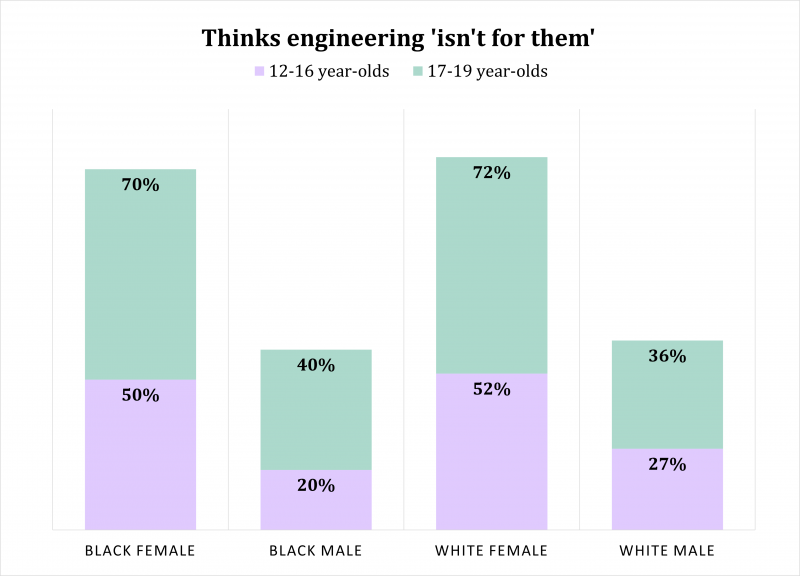
Motorsport is far from cheap. Whether you want to be a driver or an engineer, it usually takes a lot of money and resources to make it to the pinnacle of motorsport. Data from the survey showed that as women get older they are more likely to feel like ‘engineering isn’t for them.’ Among black and white females in the study, that feeling increases by 20% from 12-16 to 17-19 years old. Data shows that for women in particular, the belief that they could have a career in motorsport falls to an astonishing low as they go through school.
This can be attributed to key barriers restricting young women from pursuing engineering. Throughout the study, it is apparent that a lack of understanding or knowledge about motorsport develops as young people age. Schools aren’t promoting motorsport as a viable career option, especially when financial struggles are factored in. Often, young people from disadvantaged backgrounds are steered away from pursuing careers that will put them in a lot of debt. With the amount of education and experience needed to pursue motorsport, the money adds up.
Fadli Dokkali said: “I wouldn’t have applied for the course if it wasn’t for Mission 44. I wanted to get a master’s degree but I simply did not have the funding, and the scholarship gave me that chance to keep pushing towards my dream.”
This is why many people in the motorsport industry are starting from the ground up. Mission 44 partnered with Teach First in 2021 to recruit and train more black STEM teachers working across disadvantaged schools in England. A similar initiative is a programme called Girls on Track UK. Adopting Susie Wolff’s ‘Dare to be Different’ initiative, the joint initiative between the FIA and Motorsport UK aims to inspire girls and women to find their rightful place in the motorsport industry.
She shared: “My education as a child was impacted by having teachers that did not care about my special needs or goals, so having a passionate and empathetic teacher will open so many doors for the next generation.”
“It’s important for kids to see people like them because you can’t aspire to be something you can’t see. Having a successful role model with a similar background to you is so important, it gives kids that aspiration.”
Girls on Track runs community events, school events, webinar series, and networking opportunities for young girls to connect with women in motorsport and build a community that will inevitably lead to more women becoming employed in the motorsport industry.
“There’s still a lot of work to do to break those chains of influence and generations of advantage”
Programme Manager Jenny Fletcher has been instrumental in the initiative, with years of teaching experience leading her to the programme’s helm after emailing Susie Wolff about a job opportunity on a whim. Fletcher initially started as a primary school teacher incorporating lessons about motorsport in the curriculum, realising that girls in her class had less interest in the industry and sport than boys. After months of teaching and combating the narrative that motorsport is for boys, she realised that for young girls to find their love for motorsport, they must be given a chance.
Fletcher said: “I feel blessed on a daily basis that I get to be in this position. I get to see the change, I get to see the impact, and I get to inspire girls to realise that motorsport is an amazing industry to work in. There’s no reason at all why girls shouldn’t be welcomed into this community.
“It’s going to take time, but over the last eight years, we are slowly seeing a difference. The first set of girls started with us at just eight years old, even now that they’re 16, we’ve got a while to go before we truly see that big change.”
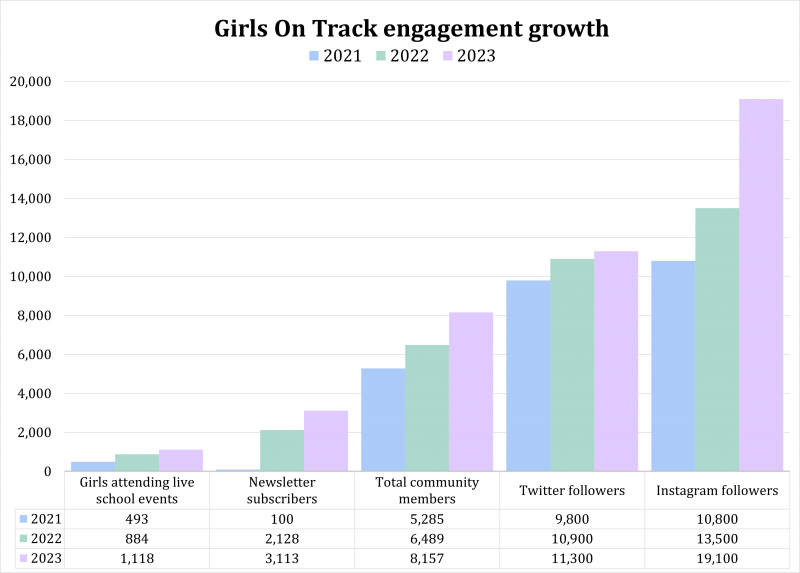
Since 2021, Girls On Track has experienced a 77% increase in their Instagram following, and a 54% increase in their total community members. With engagement and interest on the rise, their community is growing with more young women realising their passion for motorsport each year. As more young women join the community, members are seeing a rise in the number of potential connections and opportunities made available to them. Each year, the aim of growing the number of women in motorsport is increasing as Girls On Track pushes women through the ranks.
As explained by Fletcher, the real joy is creating a space within motorsport for young people to find themselves in – especially for those who may be at a disadvantage. She said: “If you don’t know someone who might be able to introduce you to the industry, it’s virtually impossible to get your foot in the door.
“One of our targets is to make sure that 50% of the pupils attending are in the pupil premium, which means they are from low-income families. We want to make sure that they are being offered the chance to do something that they perhaps wouldn’t ordinarily get.”
In a similar fashion to Mission 44, Girls On Track shares the ambition of starting fresh. By teaching young girls that motorsport is a viable and fun industry to work in, more women will slowly find spaces in the industry. The paddock was once barren of women, let alone people of colour and different sexualities. Now, it’s becoming a more diverse environment with women taking on roles across a range of sectors. But the fight is still ongoing. The process can be painstakingly slow for some people, but for others, it’s about laying down that foundation.
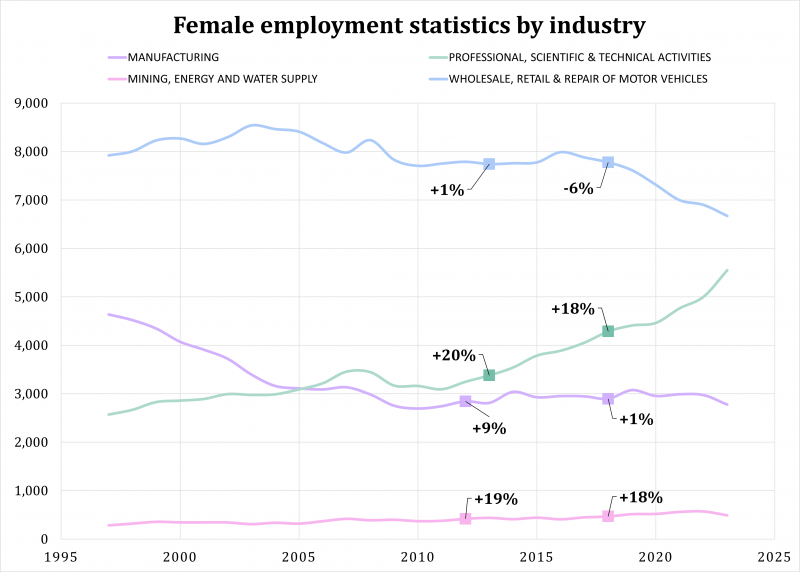
Data from the latest ONS Labour Market Overview shows that over the last two decades, more women are pursuing careers that could lead them to motorsport. The number of women becoming mechanics, engineers, and technicians is increasing despite the impact of the Covid-19 pandemic.
While most industries in the UK were affected by the pandemic, including the manufacturing, mining, energy and water supply sectors, there has been a 24% increase in women pursuing professional, scientific, and technical activities since 2020.
The manufacturing, mining, energy and water supply sectors were experiencing a steady increase in female employment before the pandemic hit in 2020, experiencing a 6% decrease in the number of employed women in these sectors from 2020 to 2023. However, both sectors are expected to recover in the next five years as interest in motorsport grows amongst young women in the UK.
Fadli Dokkali added: “The reality is that motorsport is an elitist sport. Yes, we have these programmes but there’s still a lot of work to do to break those chains of influence and generations of advantage – it can’t just be scholarships. It must be a follow-up and a push.
“Change comes from asking and pushing, or it just won’t happen. It’s going to take a long time, but the biggest impact will come from starting young, and teaching the kids that they can get to motorsport no matter who they are or where they come from.”
“LGBTQ+ inclusion and gender diversity within the sport are inextricably linked”
Encouraging true diversity and inclusion goes beyond highlighting and supporting any particular characteristic. The motorsport industry must create targeted initiatives while bringing communities and support networks together. Reflecting on this, Fadli Dokkali spoke of the importance of Racing Pride and its community making her feel safe to be herself by initiating challenging conversations that are too often either neglected or negatively framed within the industry, even against the backdrop of broader progress.
She explained: “On my own platforms, I’ve spoken about being neurodivergent, disabled, and being a woman of colour, but until Racing Pride, I never addressed the challenges of being part of the LGBTQ+ community.
“It was really encouraging, and it pushed my boundaries because intersectionality is really important. All of these things are a part of me, and they define who I am. Speaking at Accelerate Pride was one of the first moments I publicly embraced my sexuality, and now I know that there is a big community for me to be supported.”
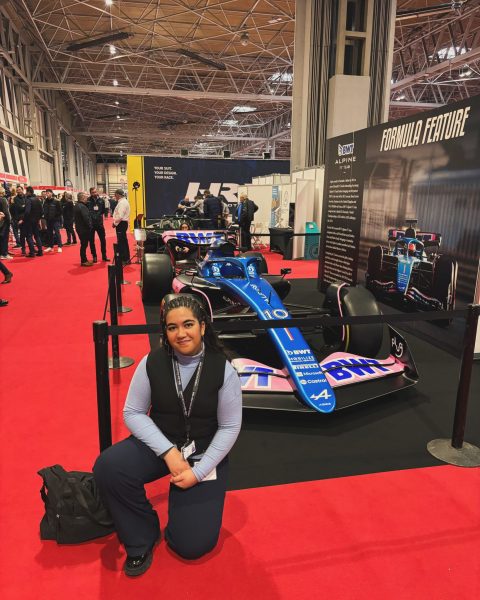
With support from Racing Pride, and based on feedback from programme participants, Girls On Track UK has actively embraced the LGBTQ+ community by stating explicitly in its published materials that ‘Girls on Track UK is proud to be an inclusive environment and welcomes all trans, non-binary, intersex, and gender fluid people who would like to be part of our community’.
This sits alongside Motorsport UK becoming the first FIA-affiliated national governing body in world motorsport to publish a trans inclusion policy in November 2023; a policy which ‘commits Motorsport UK – the governing body of UK motorsport – to the inclusion of non-binary, gender fluid, intersex and trans people’ across all activities it governs.
Racing Pride is proud to have many female-identifying ambassadors occupying a range of roles across the motorsport industry. The successful collaboration between Racing Pride and the global fan community Girls Across The Grid, pioneered by a joint event held around the Autosport International Show in January 2024 which was open to both communities, further demonstrates how progress for women in motorsport and LGBTQ+ inclusion mutually support one another.
Racing Pride Co-Founder Richard Morris emphasised: “LGBTQ+ inclusion and gender diversity within the sport are inextricably linked. Both of our organisations are working to break down stereotypes of who ‘belongs’ in this space and to show that it can be welcoming for all”.
Author: Shayni Solanki



